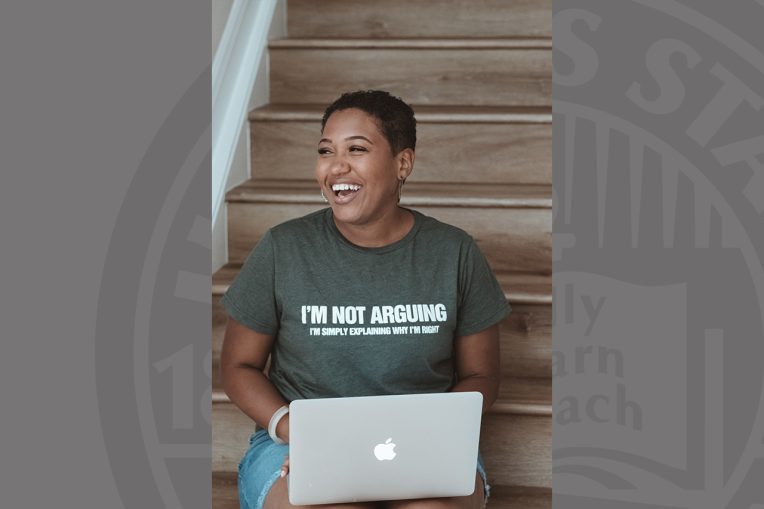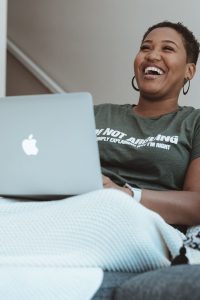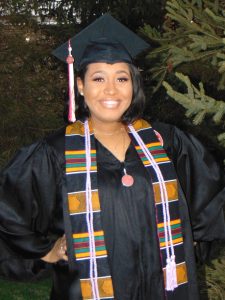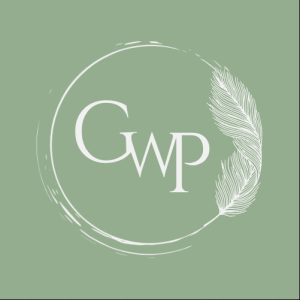Gabrielle Brown ’20, is an Illinois State University alum from the Department of English’s publishing studies program. During her time as an undergraduate, Brown completed a production internship at the Publications Unit where she transcribed and edited Clarissa Minnie Thompson Allen’s Treading the Winepress (Downstate Legacies, 2019) and completed the typesetting and interior design for The Book of Kane and Margaret by Kiik Araki-Kawaguchi (FC2, 2020).
Using her publishing degree, Brown has worked as a writer, freelance editor, and beta reader, and has since started her own editorial company, Gab With Purpose, where she aims to get more Black authors and their stories published. Recently, she published Connecting Black Creatives, an e-book directory that connects Black authors, readers, content creators, and fans of Black literature. In this article, Brown discusses how she started her business and how the skills she built during her internship at the Publications Unit set her up for success.
What drew you to the publishing studies major and the internship with the Publications Unit?
When I returned to school as a nontraditional student, I knew I wanted to pursue something that would combine both the art and the business of storytelling. It was not enough to major in English alone. I had to ensure that when I left Illinois State University, I’d be on the fast track to pursuing my dreams because I didn’t know if I could return for a master’s degree. Advanced education is a privilege that not all of us are afforded, and had I not been working as a janitor at the University, I wouldn’t have been able to attend classes, especially as a mother of two smaller children. I wanted to make sure whatever I took part in could be used to propel myself forward in my career and any other professional endeavors.
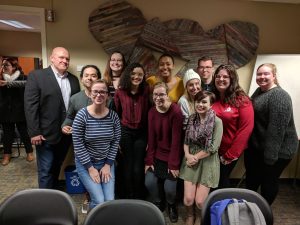
The memory is a little hazy, so I may be mixing up some things, but I remember taking an English class where we either discussed the Publications Unit or went to visit it, and they discussed both English 254 (Introduction to Professional Publishing, the course taught by Publications Unit staff) and the internship opportunities that were available. Upon hearing about them, I immediately lit up. I remember hearing them talk about the different publications they worked on and all the ways students get hands-on learning in the publishing business. Their descriptions sounded exactly like what I was looking for, and I just remember praying, wishing, and hoping that I would be one of the few chosen to work in that internship. Then I got the chance to take English 254 with Dr. Steve Halle (Director of the Publications Unit), which cemented my decision to pursue the internship with the Publications Unit even more. There was no way I could graduate from Illinois State University without working in the Publications Unit, and I took every available chance I had to foster relationships, network, and learn as much as I could while in English 254, so that when it was time for me to apply for the internship, they would remember who I was. Plus, having the opportunity to work with Dr. Halle and Holms Troelstrup (Assistant Director of the Publications Unit)? Who would want to pass that up? They really are phenomenal people, and I’m so grateful to have gotten a chance to work with them.
When did you realize that you wanted to start your own editing business? What was your motivation behind this decision?
When I realized that my existence as a Black woman would determine how I moved through the world of publishing.
While interning, I learned a lot about the business in all its forms: the good, the bad, and the indifferent. I also got to engage in different social circles with other Black creatives which allowed me to see how the things I’d learned in my intern experience did not always equate to the reality of publishing, especially for people who looked like me.
The reality is publishing is a predominantly white field, and in order for diversity to be authentic to certain experiences, especially as a Black person, it means that sometimes you have to decide between playing the game or starting your own playing field. If I did not want my stories or the stories of the clients that I worked with to be diluted—I was doing freelance editing even while I worked as an intern—I had to be OK standing outside the gate at times. If I wanted my fellow Black creators to be able to tell the stories of their hearts, I knew there was no way I could just go and get a job somewhere to dabble among the red tape for someone else. I had to be my own MVP. I had to be brave.
“I have the audacity to believe that I deserve to be in the room with people who may not understand the experience that I write from, or understand the experiences of the people I represent, but we all deserve to be there because our stories matter.”
—Gabrielle Brown
Part of my motivation was due to my grandmother. She sadly passed away in April 2022, but she always encouraged me to do things for myself. I watched her navigate life as a dark-skinned Black woman while hearing hundreds of stories about what it meant to grow up during Jim Crow—especially here in the North. She taught me what it meant to be willing to be different because you were already different, so why not embrace that fact? She was an audacious and proud woman every time she stepped into a room. Even when she was silent, you could feel her presence no matter what was going on around her, and I knew being a product of who she was meant I could pursue my dreams. I guess that means audacity is also a major part of my motivation. I have the audacity to believe that I deserve to be in the room with people who may not understand the experience that I write from, or understand the experiences of the people I represent, but we all deserve to be there because our stories matter. This country was built on the backs of people who look like me, and while systematic oppression tries to stifle many of us, it is important to remain vigilant and have the audacity to exist in this world, fully. For if we don’t, it (the world) will try to trick us into believing that we don’t deserve to be here. The reality is, if we weren’t here, the world wouldn’t be what it is. And that’s a fact no one can take away from us.
What does a typical workday look like as a freelance editor and business owner?
Lots of early mornings and late nights. Depending on the type of service I’m providing for a client, I usually try to devote two to three hours to their project each weekday, if not more.
And because I work a day job, I have to fit my editing work within a certain allotment of hours each day. If I’m responsible and I wake up at 5 a.m., I can get anywhere from 2-3 hours done before I start my day job. If I decide to sleep in until it’s time for my littles to get up for school, I end up working in the evenings and can usually get a bigger chunk of time—4-5 hours sometimes longer—depending on the day of the week. I know that if I have a particularly busy weekend, Monday is going to be the best day for me to tackle as much work as possible because Tuesday I’ll be sluggish no matter what I do, no matter how many hours I sleep—it’s just that way.
So, knowing your own quirks, knowing how you respond to busyness, how sleep patterns and the day of the week can impact your work ethic, all of that really does help me to set my work schedule in advance. This is also why I hate last-minute things because if it’s last minute, I probably don’t want to do it because I’ve already planned the schedule out at least two weeks in advance! Oh, and I’m a procrastinator, so planning my procrastination in advance has been a game changer.
How did the Publications Unit internship prepare you to run Gab With Purpose? What other influences in your life helped you get started?
So, when I was interning at the Publications Unit, I was also working a full-time job overnight, 11 p.m. to 7 a.m. Often, I could be seen napping in my car before going into the Publications Unit because why go home just to have to come back to campus? I also took classes and parented two children. The Publications Unit set me up for what my life would look like while I pursued my freelance editing business full time.
“The greatest thing the Publications Unit taught me, beyond just the skills and the knowledge of the work it takes to be a part of the publishing industry, was how to make all these moving parts stay together.”
—Gabrielle Brown
What does it look like when you have other responsibilities that are just as important as the work you’re doing? It looks like tiredness and frustration and excitement and a zeal to keep pushing even when you think you’ve given your all. It looks like balance and maneuvering and being able to pivot. So, the greatest thing the Publications Unit taught me, beyond just the skills and the knowledge of the work it takes to be a part of the publishing industry, was how to make all these moving parts stay together. It also taught me to appreciate the concept of time because it passes so quickly, and if you aren’t present in the moment, it really will escape you without you even realizing it.
Remember how I said audacity was my motivation, well it was also the influence because I have a lot of it to spare apparently, perhaps too much depending on who you ask. My grandmother had a bunch and she passed it on to my mother, and my mother passed it right on down to me. You have to be some kind of “peculiar” to be willing to jump into a world that is experiencing something no one from my generation had ever experienced and say, “I’m gonna start a business” without a surefire plan. And how could you plan for something like a pandemic?
Honestly, I just really believe in myself, in the clients I work with, and in the art of storytelling, and I believe that creativity is just as important as oxygen in this world.
You started Gab With Purpose in March of 2021. How did the pandemic influence your transition from education to running your own business?
Well, sometimes I think I lost my mind a little bit because everything I expected for myself when it came to my education did not happen the way I thought it would. I’d dreamed of walking across the stage and accepting my bachelor’s degree in the presence of my friends and extended family. I’d dreamed of having this big celebration, then taking some time to decide what would be the next step in my career. I just knew I’d finally get to be that person who got a degree, went and got a job, then found out after years of working for someone else that maybe I did want to go into business for myself. Unfortunately, the pandemic happened and every plan I had up to that moment seemed impossible—and dare I say unnecessary. The last three years were full of pain and sorrow, yet they taught me how resilient my family and I were and still are.
I’m also a person of faith. I believe that life is orchestrated for us to use what would normally be considered “bad” and turn it around for our benefit. While I’d broached the subject of freelancing before graduating, I still made sure to apply to different presses to obtain additional experience because I didn’t and still don’t know it all. What I found was a little depressing. I couldn’t seem to get hired anywhere. Some jobs had laid off a lot of people and a lot of presses’ futures were up in the air.
I knew that if I was going to keep striving to pursue my dreams, I would have to be willing to pivot. Now, was starting my business in the middle of a pandemic the best choice … I say hell yeah because I haven’t failed. While this may not have been the journey I thought it’d be, I haven’t stopped working therefore I deem myself successful. I’ve seen success in ways that someone may not deem traditional, but every time I’m allowed to help a client with their work, encourage them to pursue their dreams, and ensure they are not being cheated by various entities that seek to take from the creative community instead of giving back, I feel successful. I even quit my job as a janitor to pursue this full-time, and while I have a corporate job now to help alleviate the stress of covering medical insurance—because oh my goodness that is so expensive when you are self-employed—I get to do what I love and not allow capitalism to stress me out. I also get to free up my creative mind to pursue my own writings a little more intensely because I’m not devoted 25-8 to working with clients, constantly having to move on to the next one because there is no downtime. Publishing is a constantly moving organism, a semi-well-oiled machine that, if you take your foot off the gas for too long, it can push you back further than you were when you started. So, the pandemic made me have to be courageous; even as fear sits in the passenger seat, I have to be the one in the driver’s seat.
In your time at the Publications Unit, you worked on transcribing and editing Treading the Winepress by Clarissa Minnie Thompson Allen, a novel first serialized in the Boston Advocate between 1885 and 1886 that would have been only the second novel published by a Black woman in the United States if it had been published in book form. How has this experience contributed to your current work? How have these skills transferred to your current job?
Oh, I have to be honest, archival editing almost got me. I loved transcribing that newspaper film even though it was tedious work and extremely hard to do with all of my other responsibilities. I really loved reading and trying to decipher information from centuries-old newspaper films—being able to research and understand not only the works but the individual who created those works; searching for more information on Miss Thompson Allen while realizing that even if you aren’t the first or the second, you still get to be remembered if you’re the third, fourth, fifth, and so on.
“I will forever be grateful to Dr. Halle and the Publications Unit for the experience of working on [Allen’s “Treading the Winepress”] because it truly changed my life in ways I’m unable to fully articulate.”
—Gabrielle Brown
It was an amazing experience. She was doing something that many people have no idea about. When people think of 19th-century Black literature, they think of slave narratives, maybe some poetry or autobiographies, and perhaps a few essays. But a story that involves drama with mystery and intrigue? Those narratives weren’t being written by Black people, particularly a Black woman, as often, or so they would have you believe. But here, here is this woman, a Black woman in all of her creative audacity to stand in the face of not only societal expectations but numerous other pressures I’m sure too many of us can relate to. She even had to move from the Christian Recorder to the Boston Advocate because of the content she was writing. She was so talented, and her story was so intriguing that what started in the middle of the newspaper ended up on the front page because people were so eager to know what would happen next. That desire to know more is what motivates a lot of my fellow writers. When we know that people want to know what happens next, it’s easy to allow the characters to speak to us.
Now I get to help motivate individuals by guaranteeing their characters are the ones speaking, that they’re allowing them to be full-bodied, and ensuring that the parts of the story that sometimes get overlooked like the setting or pacing can contribute to how well the characters are able to tell their stories. And I also get to use it in my own writing because I get to remember the passion and excitement I felt transcribing the next set of newspaper films. I wanted to know what happened to those besotted characters in love or the other members of that town, whose stories we don’t quite get the ending to because we haven’t been able to find the end of the story. I will forever be grateful to Dr. Halle and the Publications Unit for the experience of working on that project because it truly changed my life in ways I’m unable to fully articulate.
On the Gab With Purpose website, you talk a bit about the intersection of your identities as a writer, editor, and a Black woman and how “every part of [your] Black existence gets to be present in everything [you] do?” What has it meant for you and your clients to have a company like Gab With Purpose in the industry today?
I’d like to think that my company represents freedom.
I have just as many non-Black clients as I have Black clients, and I make it a point to ensure that if I can’t help them, I’m putting another Black woman in their face who does what I do. There are many ways to be marginalized in the publishing industry, but I can only attest to what it means to be Black and a woman because that’s my identity. That’s my experience. I don’t try to take up space in areas I have no connection to; I just support and amplify. I do my best to make space for people to speak about their experiences and actively listen when it’s someone else’s turn to speak.
I acknowledge the importance of “intentional” support because nobody’s going to get everything right, but everybody has the chance to “do” something right.
My company means that regardless of what I do—even if it’s something wrong and I have to apologize—it’s purposeful. We’re not doing anything without a rhyme or reason. Every move I make is something that I’ve painstakingly considered so clients can rest assured that they’ll be handled with care because I know I want that for myself. Oftentimes, Black women aren’t handled with care because we’re seen as able to do it all with the bare minimum, so if you work with me, I care about you, and I want to see you win even if that looks different from what I think it should look like.
You spoke a lot about balancing school, the internship, having a job, and raising two children, which is a tremendous feat I might add. Do you feel like this experience pushed you toward owning your own business and freelancing?
So, I’ve always been a college student who worked full time. I never really got to have the college experience where you just go to class and maybe have a 5-to-10 hour-a-week job; that was never my experience, even before children. So having a family and going back to school and working a full-time job just felt like I was adding more weight to the bench press essentially. You’re just building muscle really, and even though it did not accurately set the expectation for what owning my own business would look like—because that’s a completely different experience from anything I’ve ever done in my life—it did allow me the opportunity to know how to read my body when I have overextended.
So, my advice to anyone who is or will be balancing multiple things is to listen to your body. Prepare yourself to need time away: time away from the job, time away from school, from work, and even some time away from your family. You have to decompress because if you just keep piling everything on, it will overwhelm you, and burnout is a very hard thing to get over. It’s also much harder to do while still trying to balance, so listen to your body and take care of yourself because health is wealth.
Do you have any advice for current publishing students as they move into the job market or dream of starting a business? Is there something you wish you would’ve known when you were in their shoes?
If you are a creative who is looking to go into a field where you work with other creatives, be sure that you have the capacity to do both. Creativity in and of itself requires focus, drive, and time to replenish. So, if you are a writer who is also looking to work in publishing, prepare yourself to devote a big chunk of your creativity to other people and learn how to be OK with that.
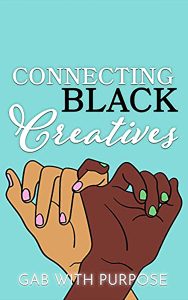
If you are going into the publishing industry and are part of a marginalized group, prepare yourself for difficult and/or uncomfortable conversations or decisions.
You don’t “have” to be an activist to be a part of the publishing industry but just remember if you stand for nothing, who knows what you’ll fall for.
And on the off chance that you do wish to make a difference in whatever field you go into, you have to know that your desire to see change in an industry can and will impact your ability to tolerate certain things. Just know you won’t ever be alone, as I’m confident someone out in the world is likely thinking/believing something similar.
I would also advise seeking out community. Begin engaging in spaces now where there are others who have similar interests to you in publishing. Social media is great and fine, but try to find real people that you can see face-to-face; even if it’s via Zoom, start making connections so you can build a community of people to hold you up when it gets hard because it’s going to get hard.
Publishing is a never-ending thing (shoutout to Steve Halle for warning me in advance). Even when we get to the end of the year and the queries slow to a crawl and all of that, people are still working.
Just know you’re going to be working all the time. Your workload is going to exceed what it should a majority of the time.
Prepare yourself and learn to balance in a way that allows you to have downtime. Being able to decompress will be your best friend.
You’ve told me about your recently published e-book directory Connecting Black Creatives. What else is next for you and Gab With Purpose? Are there any upcoming projects you’d like to talk about?
Since I’ve been working a corporate job, I’ve slowed down on taking in clients but that’s because I really want to focus on amplifying Black creatives in publishing spaces. So, what’s next for Gab With Purpose is you’re going to see lots of talk about how Black publishing community members support one another, uplift one another, and amplify the works of Black authors and Black literature.
As for me on the writing side, I am finishing a couple of my own works in progress or WIPs, which should be ready for editing in the next few months with a publishing goal of late 2023 or early 2024. My author pen name is Gabrielle Rochelle, so if you are interested in stories about magical Black people who work together to save the world while embracing their humanity, then be on the lookout for my debut novel, The Glowing Shadows Trilogy.
In the meantime, you can find Connecting Black Creatives on Amazon, Barnes & Noble, iBooks, and Kobo. And you can find Gabrielle and Gab With Purpose on TikTok, Instagram, Twitter, and Facebook.
About the author: Gwen Johnson is a 2023 graduate of Illinois State University where she majored in English—publishing studies and minored in history. She completed this interview and article during her production internship at the Publications Unit, and she also served as the nonfiction editor for Euphemism, the University’s online creative arts journal. In the summer following graduation, Johnson was selected from a competitive pool of applicants for a publishing internship at the independent, women-led publisher Sourcebooks in Naperville.
You can find additional information about the publishing studies sequence and student opportunities at the Publications Unit or contact Steve Halle, director of the Publications Unit, at cshalle@IllinoisState.edu or (309) 438-7481. Follow the Publications Unit on Twitter @PubUnit_ISU and on Instagram @PubUnit.
